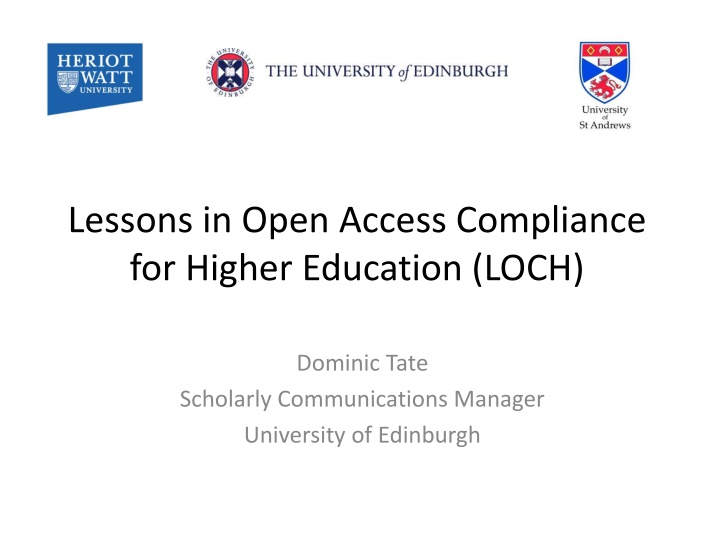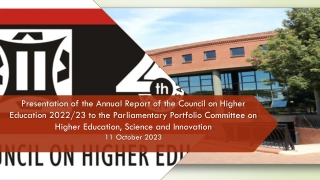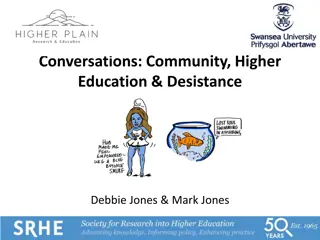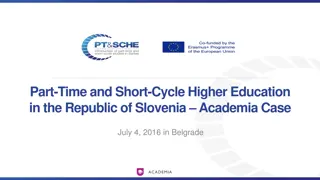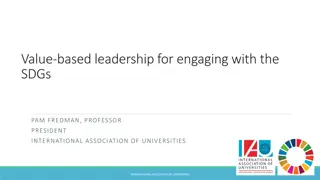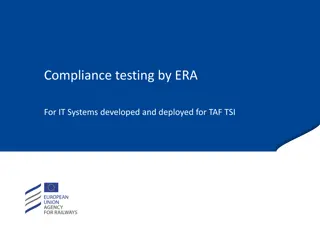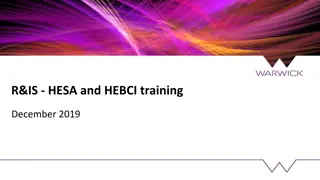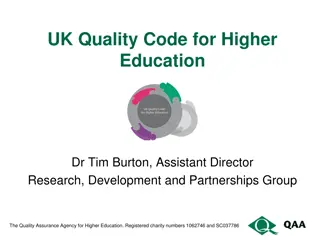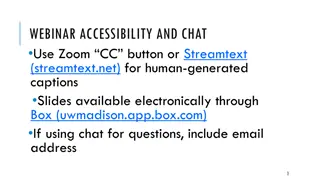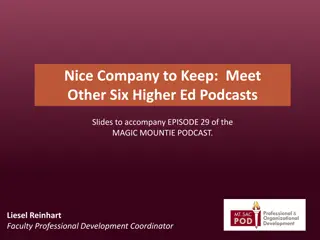Lessons in Open Access Compliance for Higher Education
The approach of managing Open Access payments, using tools like PURE, and adapting workflows for seamless compliance. Learn about the University of Edinburgh's strategy towards REF2020 and deposit requirements for research publications
Download Presentation

Please find below an Image/Link to download the presentation.
The content on the website is provided AS IS for your information and personal use only. It may not be sold, licensed, or shared on other websites without obtaining consent from the author.If you encounter any issues during the download, it is possible that the publisher has removed the file from their server.
You are allowed to download the files provided on this website for personal or commercial use, subject to the condition that they are used lawfully. All files are the property of their respective owners.
The content on the website is provided AS IS for your information and personal use only. It may not be sold, licensed, or shared on other websites without obtaining consent from the author.
E N D
Presentation Transcript
Lessons in Open Access Compliance for Higher Education (LOCH) Dominic Tate Scholarly Communications Manager University of Edinburgh
Who We Are University of Edinburgh Large, research-intensive Russell Group University with 30,000 students and 12,000 staff Heriot-Watt University One of the top UK universities for business and industry with 11,800 students in 150 countries St Andrews University Scotland s oldest university founded in 1413. Research-intensive with over 25% of turnover from research grants and contracts.
Approach Managing Open Access payments, (including a review of current reporting methods and creation of shareable spreadsheet templates for reporting to funders), Using PURE as a tool to manage Open Access compliance, verification and reporting, Adapting institutional workflows to pre-empt Open Access requirements and make compliance as seamless as possible for academics.
What we are working on A functional specification for PURE, to ensure compliance with the OA requirements for the next REF, Casestudies to review the OA landscape at each partner institution, First look at revising workflows and communications in light of REF requirements.
Towards REF2020 The University of Edinburgh s Approach to Open Access Requirements in the Next REF Dominic Tate Scholarly Communications Manager Library & University Collections
Scope & Timeline Policy applies to all journal articles & conference proceedingsaccepted for publication from April 1st 2016 We need to ensure that we are 100% compliant before April 2016 to ensure that every researcher can select any publication for inclusion in the next REF. There may be extra credit available in Research Environment for earlier implementation.
Deposit Requirements Must be deposited in an institutional repository (PURE) or subject repository (e.g. arXiv or PubMed Central) DEPOSIT IMMEDIATELY ON ACCEPTANCE by the publisher (no later than three months after this) Researchers should deposit the 'author s final version' or 'post-print' which can be replaced with the final published PDF version at a later date.
Access Requirements Must be made Open Access at the earliest possible opportunity If you publisher requires an Open Access embargo, then this can be respected. In reality OA likely to happen at a date 6 months+ after publication Normal maximum embargo is 24 months (panels C & D), though some exceptions may apply.
Implications Any output that falls within the scope of this policy and is submitted to the post-2014 REF but does not meet the requirements without a valid exception will be given an unclassified score and will not be assessed. From April 2016, when the policy comes into force, there will be no scope for retro-active compliance so we must ensure everyone is aware of the requirements ASAP.
What are we doing? The Scholarly Communications Team is working with College Research Offices and Schools: Local support staff being recruited Existing administrative staff being given training Project plans being implemented for each School Scholarly Communications acting as a central co- ordinating authority for the University Liaising with HEFCE Co-ordinating development of PURE Jisc Pathfinder best practice project
Our message to researchers Researchers must take action immediately on being notified of acceptance by a publisher. Either: Log in to PURE, create a record and upload the correct file OR Email your acceptance email and the file to the appropriate support email (TBC) Researchers must contact us if they are unsure of how to do this or how the policy affects your publication. Scholarly Communications Team OR in-School support
Devolved Staffing Model Central Support for the Project in Scholarly Communications Team (Library) - 4 FTE Humanities & Social Sciences OA Advisor (1 FTE) with support from temporary support staff (2.5FTE) Medicine & Veterinary Medicine One OA Advisor (1 FTE) with deposit made by local administrators (hard to quantify accurately 2 or 3 FTE?) Science & Engineering Support from existing School support staff (maybe 2 FTE?)
What is going well? We have undertaken LOADS of outreach over the last few months We have spoken to most Research Directors about the new policy Most Schools have had a visit about the policy Most of the Schools now have local plans in place The new technical requirements are defined and in development
What do we need to improve? We still have not issued an all-staff email about the policy this is long overdue We sometimes forget to highlight the benefits of Open Access We always need to plan each meeting to make sure we get the best out of every opportunity to talk to researchers Validation workflow needs to be improved Reporting needs to be improved Many administrators need more training
Top Tips? Make sure University Senior Management are aware of the policy and its implications (and bonus points for early adoption!) Formulate a plan and treat this like a project Make sure you have adequate staffing resource and that responsibilities are clear Provide clear, simple guidance for researchers Review progress regularly and don t be afraid to make changes
